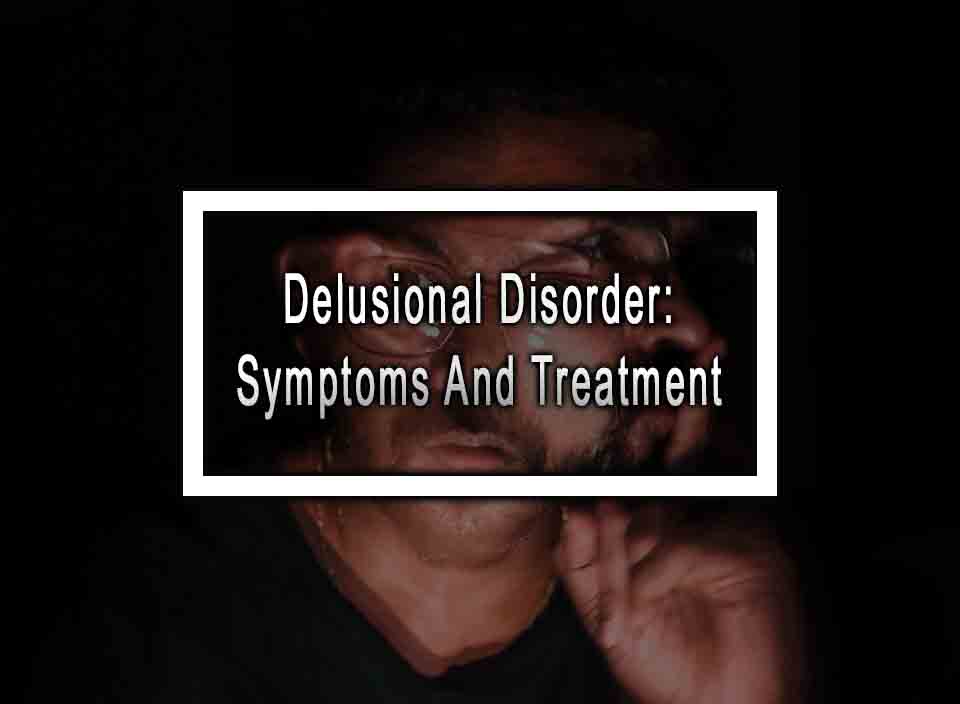Delusional disorder is a mental illness that is characterized by the presence of one or more delusions that persist for a month or longer. A delusion is a fixed belief that is not based on reality. People with this disorder may believe that they are being followed or that their thoughts are being broadcast to others. They may also believe that they have a special mission or that they have a special relationship with a celebrity or political figure. This disorder can cause significant distress for the person with the delusional disorder as well as for their family and friends. In this article, we will discuss the symptoms and treatment of delusional disorder.
Table of Contents
ToggleSymptoms of delusional disorder
The primary symptom of delusional disorder is the presence of one or more delusions that persist for a month or longer. The delusions may be centered around a particular theme, such as persecution, jealousy, grandiosity, or somatic complaints. Persecutory delusions are the most common type of delusions in people with delusional disorders. These delusions involve the belief that one is being persecuted or watched by others. The person may believe that they are being followed or spied on, that their phone or computer is being tapped, or that people are out to get them in some way.
Jealous delusions are another common type of delusion in delusional disorder. These delusions involve the belief that one’s spouse or partner is being unfaithful. The person may become extremely jealous and may investigate their partner’s behavior, looking for evidence of infidelity, even if there is no evidence to support the belief.
Grandiose delusions involve the belief that one has special abilities or powers, or that one is a famous or important person. People with grandiose delusions may believe that they are the Messiah, a prophet, or a political leader. They may also believe that they have supernatural powers, such as the ability to read minds or control the weather.
Somatic delusions involve the belief that one has a serious illness or disease, even if there is no medical evidence to support the belief. People with somatic delusions may believe that they have cancer, HIV, or another serious illness. They may become preoccupied with their health and may seek out multiple medical opinions or treatments, even if they are healthy.
Treatment of the delusional disorder
The treatment of delusional disorder typically involves a combination of medication and psychotherapy. Antipsychotic medication is often used to treat the symptoms of delusional disorder. These medications can help to reduce the intensity and frequency of delusions, as well as other psychotic symptoms such as hallucinations and disorganized thinking.
Psychotherapy can also be helpful in treating delusional disorders. Cognitive-behavioral therapy (CBT) is often used to help people with delusional disorders challenge their distorted beliefs and develop more realistic ways of thinking. During CBT, the therapist works with the person to identify the thoughts and beliefs that lead to the delusions and helps them to develop alternative ways of interpreting the events and experiences that trigger the delusions.
Family therapy can also be helpful in treating delusional disorders. Family members may play a role in reinforcing delusional beliefs or may become frustrated or angry with the person, which can exacerbate symptoms. Family therapy can help family members to understand the disorder and to learn how to communicate effectively with the person.
In some cases, hospitalization may be necessary to manage severe symptoms of delusional disorder. Hospitalization can provide a safe and supportive environment for the person and can allow for medication adjustments and psychotherapy.
Conclusion
Delusional disorder is a mental illness that can be highly distressing for the person with the disorder as well as for their family and friends. The primary symptom of delusional disorder is the presence of one or more delusions that persist for a month or longer. The delusions may be centered around a particular theme, such as persecution, jealousy, grandiosity, or somatic complaints. Treatment typically involves a combination of medication and psychotherapy, including antipsychotic medication, cognitive-behavioral therapy, and family therapy. With appropriate treatment, many people with delusional disorders are able to manage their symptoms and improve their quality of life.
Delusional Disorder FAQ
Here are the most common questions about delusional disorder.
How is Delusional Disorder diagnosed?
Diagnosis typically involves a comprehensive evaluation by a mental health professional, including a review of the individual’s symptoms and medical history, as well as a physical examination to rule out any underlying medical conditions.
What causes Delusional Disorder?
The exact cause of Delusional Disorder is unknown, but it is believed to be a combination of genetic, psychological, and environmental factors that can contribute to its development.
Can people with Delusional Disorder lead normal lives?
Yes, with proper treatment, many individuals with Delusional Disorder are able to lead relatively normal lives. However, the condition can be chronic and may require ongoing treatment and support.
Is it possible for someone with Delusional Disorder to recover completely?
Complete recovery from Delusional Disorder is relatively rare, but significant improvement in symptoms can be achieved with appropriate treatment. It is important for individuals with Delusional Disorder to continue treatment and work closely with mental health professionals for ongoing support and management of their symptoms.
Can Delusional Disorder be prevented?
There is currently no known way to prevent Delusional Disorder. However, early intervention and treatment can help reduce the severity of symptoms and improve overall outcomes. It is important to seek help from a mental health professional if you or someone you know is experiencing persistent delusions.
More like this: Psychotic Disorder Symptoms












